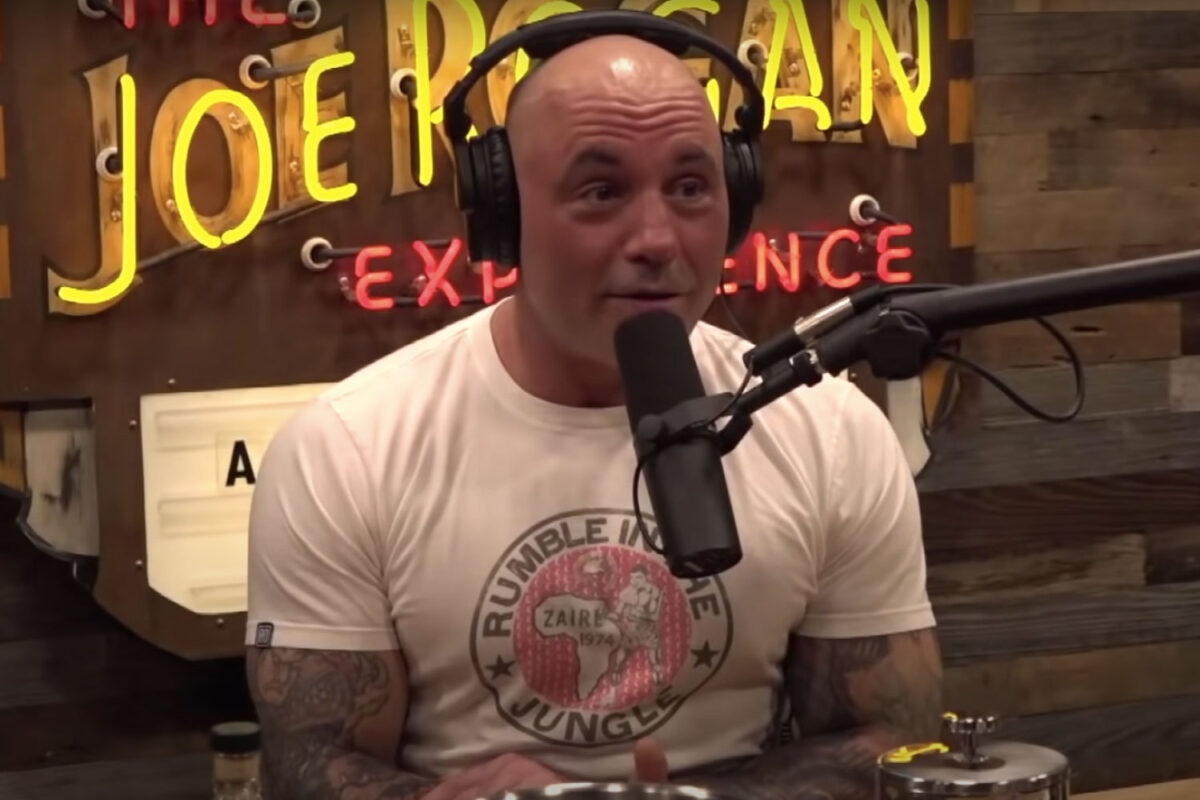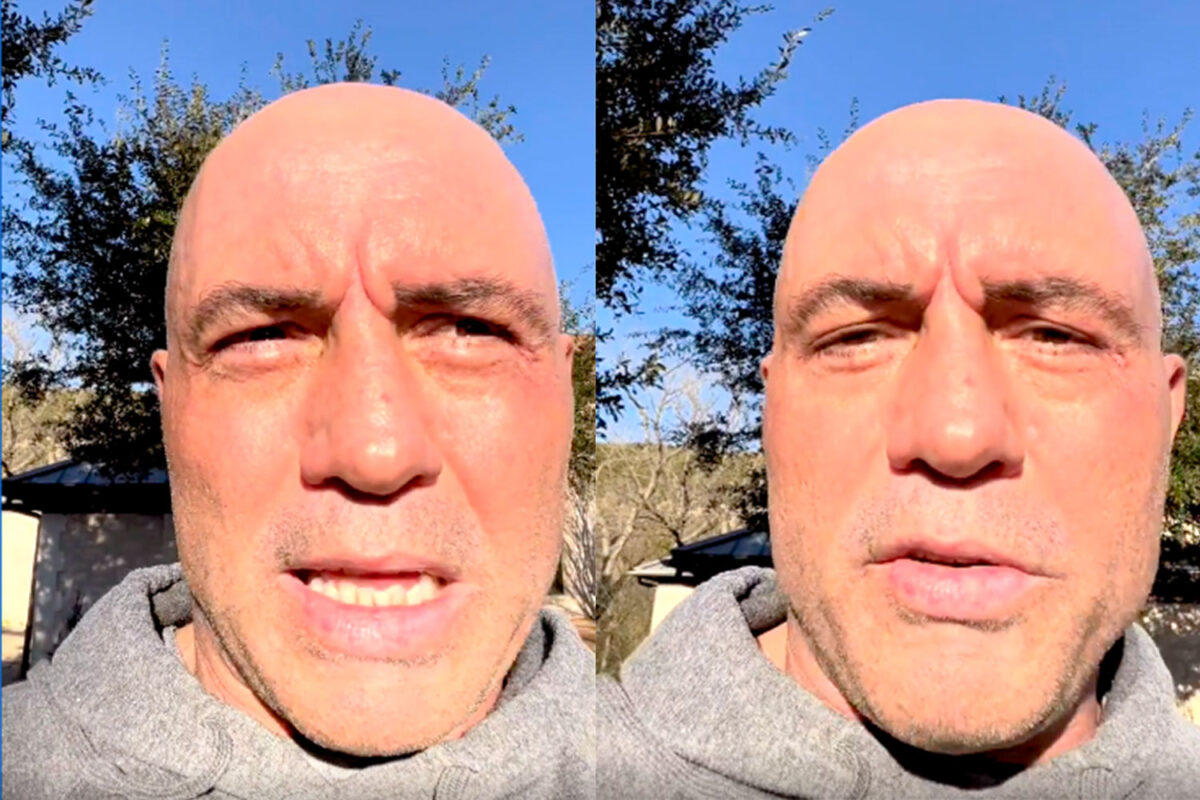Joe Rogan has responded to the controversy over recent podcast episodes in which he has been accused of spreading dangerous misinformation regarding the pandemic.
Just over a month ago, 270 medicine and science experts signed an open letter, asking Spotify to remove a December episode of The Joe Rogan Experience, which featured Dr Robert Malone, an infectious diseases specialist (and vaccine sceptic), who, according to PolitiFact, was banned from Twitter for violating the platform’s COVID-19 misinformation policies.
As The Guardian reports, “Both men were criticised for promoting several baseless conspiracy theories, including the false claim that hospitals are financially incentivised to falsely diagnose deaths as having been caused by Covid-19.”
“The appearance [also] prompted calls for White House health adviser Dr Anthony Fauci to debate Malone on the show,” (The Guardian).
The controversy recently led musician Neil Young to accuse Rogan of selling “lies for money” and leave Spotify with an ultimatum: me or Joe. Spotify stuck with Rogan. Young promptly left. Young has been followed by a couple of other artists in leaving Spotify in protest (though no massive names like Beyoncé or Bieber have joined the boycott as of yet).
Rogan took to Instagram today, posting the following video to address the controversy.
“I wanted to make a video, first of all, because I think there are a lot of people who have a distorted perception of what I do, maybe based on soundbites or headlines of articles which are disparaging,” Rogan said.
“The podcast has been accused of spreading dangerous misinformation, specifically about two episodes,” Rogan added.
“One with Dr Peter A. McCullough and one with Dr Robert Malone. Dr Peter A. McCullough is a cardiologist and he is the most published physician in his field in history,” Rogan said.
Rogan continued: “Dr Robert Malone owns 9 patents on the creation of mRNA vaccine technology and is at least partially responsible for the creation of the technology that led to mRNA vaccines. Both these people are very highly credentialled, very highly intelligent, very accomplished people and they have an opinion that’s different from the mainstream narrative.”
Others (like Young) put it much less charitably, calling Rogan’s talking to these dissenters irresponsible at best, and profit-minded at worst.
Read more about Robert Malone and his background here.
“I wanted to hear what their opinion is, I had them on, those episodes were [then accused of]… having dangerous misinformation in them.”
Rogan continued: “The problem I have with the term misinformation, especially today, is that many of the things we thought of as misinformation just a short while ago are now accepted as fact.”
Rogan then listed a few claims that eight months ago, he says, would have seen you kicked off a social media platform for saying, which are now accepted by mainstream outlets like CNN as fact (like questioning the efficacy of cloth masks, or saying that you can still catch COVID and pass it on even if you are vaccinated).
While this is technically true (we are continually learning about COVID), many argue “it [still] doesn’t mean that people should be broadcasting non-peer-reviewed medical information on one of the world’s biggest podcasts.”

The problem many people have with Rogan isn’t the fact that Rogan has controversial conversations, it’s that he doesn’t know if the experts he has on his show are right, and he then – his detractors would argue – takes very little accountability for having these conversations in front of millions of listeners.
As Junkee reported today: “Rogan himself even confirms that he doesn’t know if the experts he has on his show are right, and that he simply enjoys having conversations. It goes without saying that the issue isn’t Rogan’s desire to have conversations, it’s the fact that he takes very little accountability for having these conversations in front of millions of listeners.”
As Rogan said in today’s video: “I do not know if they’re right, I don’t know because I’m not a doctor and I’m not a scientist. I’m just a person who sits down and talks to people and has conversations with them.”
This accountability issue is something Rogan today said he is keen to improve.
Rogan thanked his critics, and said he wants to improve how he does controversial episodes, by adding a disclaimer and by immediately interviewing someone with the mainstream, expert-consensus-perspective, afterwards.
“One of the things Spotify wants to do is that at the beginning of these controversial podcasts, especially these ones about COVID is to put a disclaimer and say that you should speak to your physician and [warn people] ‘these people the opinions they express are contrary to the opinion of the consensus of experts,’ which I think is very important and I’m happy with that.”
“These podcasts are very strange because they’re just conversations. Oftentimes, I have no idea what I’m going to talk about until I sit down and talk with people. That’s why some of my ideas are not that prepared or fleshed out because I’m literally having them in real-time – that’s also the appeal of the show.”
Rogan also said he would try to do better at being better prepared and having a better range of facts on hand when discussing controversial topics.
On the Neil Young ultimatum, Rogan said: “I’m very sorry that they feel that way. I’m a Neil Young fan.”
He then shares a Neil Young anecdote about when he used to work as a security guard at a place where Neil Young was playing.
In a statement released on Sunday, Spotify CEO Daniel Ek said: “To our very core, we believe that listening is everything. Pick almost any issue and you will find people and opinions on either side of it. Personally, there are plenty of individuals and views on Spotify that I disagree with strongly.”
“We know we have a critical role to play in supporting creator expression while balancing it with the safety of our users. In that role, it is important to me that we don’t take on the position of being content censor while also making sure that there are rules in place and consequences for those who violate them.”
“I trust our policies, the research and expertise that inform their development, and our aspiration to apply them in a way that allows for broad debate and discussion, within the lines. We take this seriously and will continue to partner with experts and invest heavily in our platform functionality and product capabilities for the benefit of creators and listeners alike. That doesn’t mean that we always get it right, but we are committed to learning, growing and evolving.”
Spotify also released new platform rules, which cover (the prohibition of) promoting violence and hate, as well as its policy towards “dangerous deceptive medical information.”
Read Next
